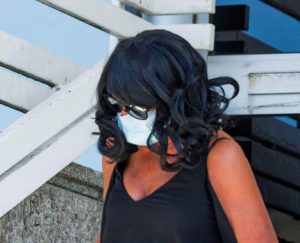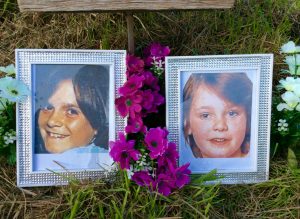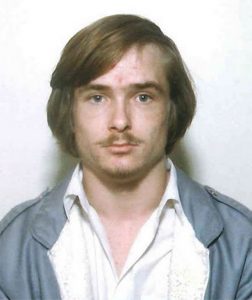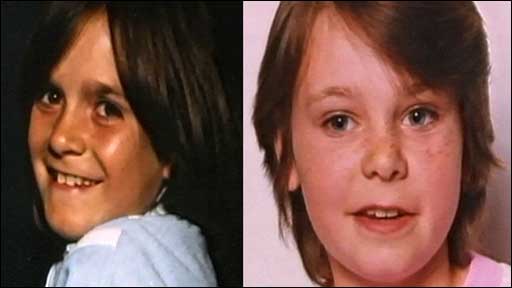A former Brighton police officer denied taking an inappropriate approach towards a vulnerable and heavily pregnant 19-year-old woman in the quest for evidence in a murder investigation.
David Edwards, known as Spud, said that he had not been “pushy” towards double murderer Russell Bishop’s ex-girlfriend Jennie Johnson during the “Babes in the Wood” murder investigation.
The retired officer said that he had asked probing questions when he visited her three weeks after the killings and while Bishop – the main suspect – was in custody in 1986.
Johnson gave birth to her second child – her daughter Hayley – less than two months later, with Bishop awaiting trial for the murder of nine-year-olds Nicola Fellows and Karen Hadaway.
Mr Edwards was answering questions under cross-examination at Lewes Crown Court by video link yesterday (Tuesday 20 April) where Johnson, 55, is on trial for perjury and perverting justice.
He had gone to Bishop and Johnson’s home, in Stephens Road, Hollingdean, with two detectives.
They had taken round a sweatshirt that had been discarded between the murder scene – in Wild Park in Moulsecoomb – and Bishop’s flat.
The top belonged to Bishop – and Johnson recognised it and identified it as Bishop’s before later coming up with a different story which she has since said is untrue.
Chris Henley, defending, asked former PC Edwards whether his behaviour and his line of questioning were rather bullying.
Mr Edwards said: “I would take issue with that.”
He said that he asked personal questions about Bishop and Johnson’s relationship because he had dealt with the couple months earlier during violent domestic incidents.
And he asked whether Bishop was still seeing a 16-year-old girl, Marion Stevenson.
Mr Henley asked: “How was that relevant? You thought that was appropriate?”
Mr Edwards said: “Yes I did.”
He told the jury that he had asked Johnson whether she would protect Bishop if he had killed the girls – and she said that she wouldn’t but that Bishop wasn’t the killer.

Mr Henley said that Sylvia Bishop had turned up and Mr Edwards said that she was “verbally aggressive” and “tore into” her son’s young and pregnant girlfriend.
But when Mr Edwards and two detectives had finished asking questions, Mr Henley said, they left Johnson alone with an angry Mrs Bishop.
Alison Morgan, prosecuting, asked Mr Edwards: “Was there anything about her (Johnson’s) behaviour that suggested to you that she was particularly vulnerable?”
Mr Edwards said: “No, not at all.”
Miss Morgan said: “Were you seeking to manipulate her?”
Mr Edwards said: “No, I wasn’t.”
Miss Morgan asked: “Did you have any concerns about the safety of Jennifer Johnson at that time?”
Mr Edwards said: “No, I did not.”
Miss Morgan asked: “Did you have any concerns about the conduct of Sylvia Bishop towards Jennifer Johnson?”
Mr Edwards said: “No, I did not.”

Retired detective Douglas Penry, 70, was asked: “Did anyone bully Jennifer Johnson at any stage.”
Mr Penry said: “No, not at all.”
The approach of the three officers had been “more the other way”, he said, adding: “What she had identified – the jumper – was quite a significant bit of information in the investigation.
“We needed her to make a statement and we wouldn’t have done anything to make her upset and not make that statement.”
Miss Morgan asked: “Was anyone there trying to manipulate Jennifer Johnson at any stage?”
Mr Penry replied: “No, not at all.”

Johnson later retracted the signed statement that she had given at her home that day – a retraction that she now admits was false.
And she kept up the lies when she took the oath in the witness stand at Lewes Crown Court during Bishop’s first trial for murdering the two young girls.
He was cleared of killing the girls and went on to kidnap, sexually assault and try to kill another girl – a seven-year-old from Brighton – in 1990.

Bishop was jailed after his 1990 trial and – after a change in the law on double jeopardy and advances in DNA science – he was retried for the Babes in the Wood murders.
He was convicted at his retrial at the Old Bailey and jailed for life.
Johnson admits lying when she retracted her signed statement to the police and lying on oath at Bishop’s first trial.
She denies perjury and perverting justice because, Mr Henley said, she was under duress from Bishop and his family.
The trial continues.







